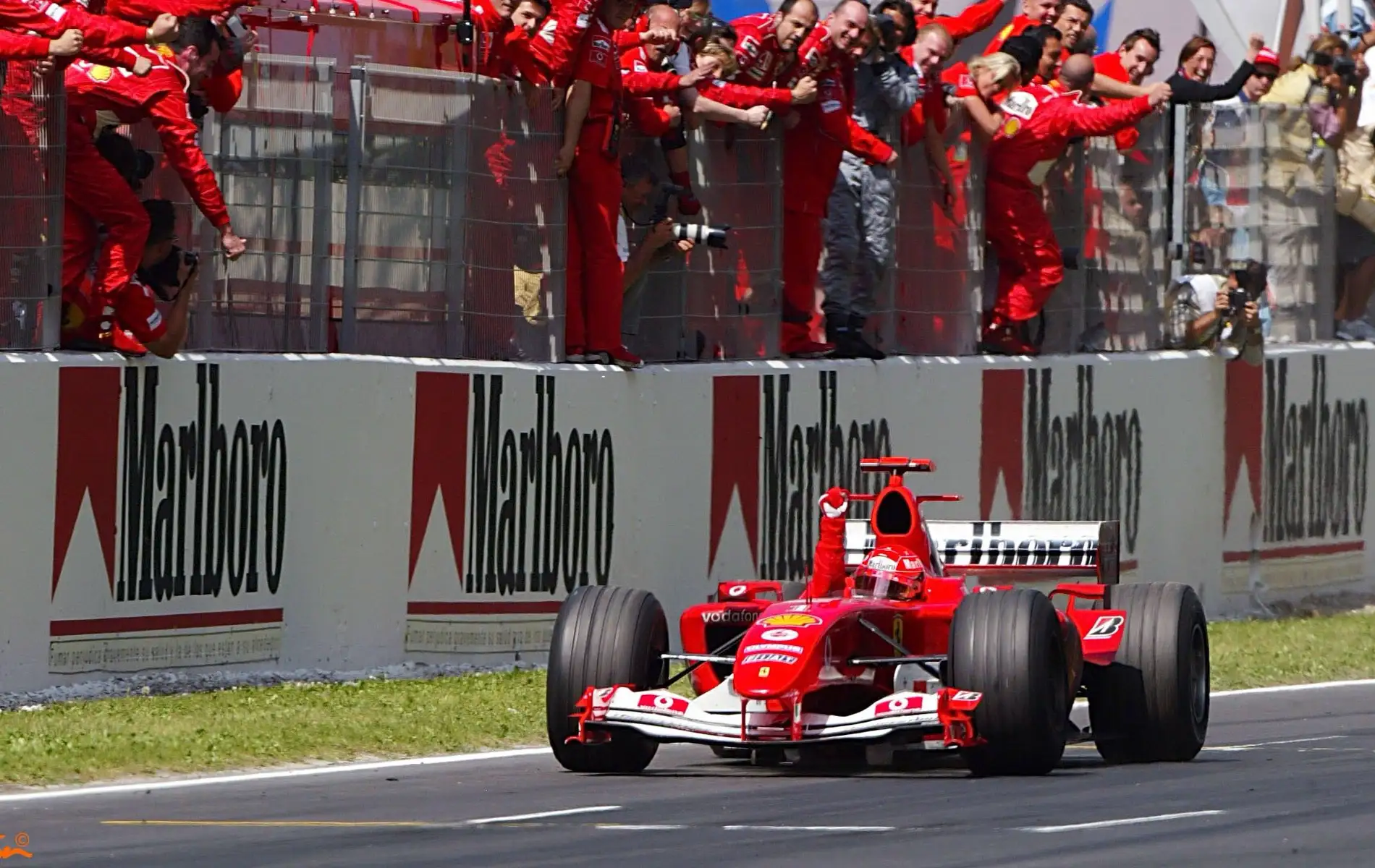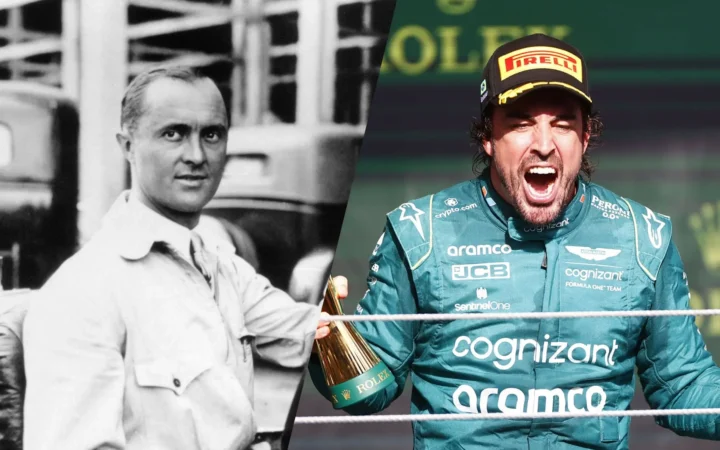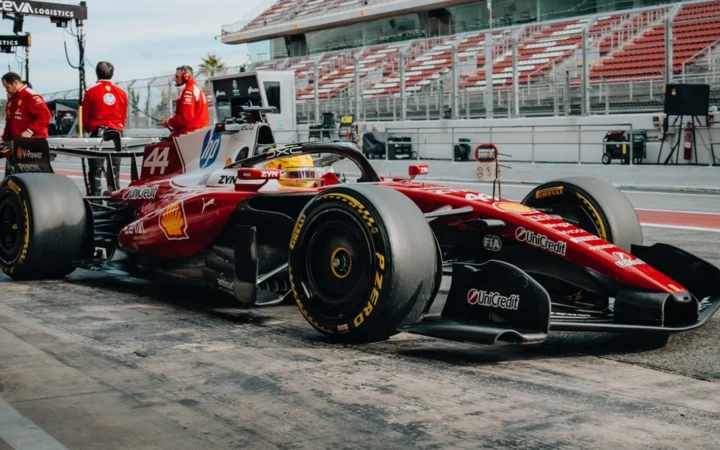When fans, pundits and drivers themselves talk about Formula One dominance, the conversation often begins with championship titles or career win totals — and rightly so. Lewis Hamilton sits atop the all-time list with 105 career victories and a joint seven world titles as of writing this on 31 July 2025. But if you’re measuring pure supremacy, the true litmus test might be this: Who has delivered the most commanding season in F1 history?
What To Know?
- Max Verstappen holds the all-time record for most wins in a single F1 season, with 19 victories in 2023 — an 86.4% win rate.
- Michael Schumacher appears twice in the top five, showcasing Ferrari’s dominance in the early 2000s with 11 wins in 2002 and 13 in 2004.
Let’s take a look at the most dominant single-season performances with a complete all-time list of the best Formula 1 campaigns in F1 history.
Most wins in a single season by an F1 driver

1. Max Verstappen: 19 Wins in 2023
The 2023 season was the Max Verstappen and Red Bull show. A dominant and historic season that didn’t just rewrite the record book — he shredded it.
In a year with 22 races, Verstappen claimed victory in 19 of them — an astonishing 86.4% win rate. For perspective, only 17 drivers in F1 history have ever won 19 races across their entire careers. Verstappen did it in one campaign.
He also racked up 575 points (another all-time driver record), leaving teammate and runner-up Sergio Perez trailing by 290 points — a gap almost unheard of in modern F1. Verstappen even set a new benchmark for consecutive wins with 10 straight triumphs.
The 2023 season will be remembered as the moment Verstappen stepped not just into the spotlight but into the pantheon of all-time greats. Explore the mind-blowing numbers behind Max Verstappen’s 2023 record-breaking run in one of F1 history’s most dominant seasons.
Formula One History Recommends

2. Max Verstappen: 15 Wins in 2022
Before the dominance of 2023, Verstappen had already shown his and Red Bull’s worryingly strong form in 2022. With 15 wins in a 22-race calendar, he established a then-record for most victories in a single season.
This wasn’t a one-off streak — it was relentless consistency, capped off by a blistering finish: Verstappen won 9 of the final 11 races. His 454 points shattered the previous F1 single-season record, overtaking Hamilton’s 413 from 2019.
What makes this even more impressive is that 2022 wasn’t a perfect year for Red Bull, with the early season looking like it would be a fight between Red Bull and Ferrari. Yet Verstappen’s adaptability ensured the title never looked in doubt.

3. Michael Schumacher: 13 Wins in 2004
If you were watching F1 in the early 2000s, you probably remember the near-invincible pairing of Michael Schumacher and Ferrari. And no year summed it up better than 2004.
Schumacher started the season by winning 12 of the first 13 races — a stretch that essentially won the title long before the final round. In total, he won 13 of the season’s 18 races (72.2% win rate), collecting 148 points in a scoring era that awarded just 10 for a win.
By year’s end, he had clinched his seventh world title — a record that stood until Lewis Hamilton matched it in 2020.

4. Sebastian Vettel: 13 Wins in 2013
Before Verstappen made 15+ wins feel normal, Sebastian Vettel in the 2013 season matched his fellow German, Schumacher, with 13 wins.
Driving for Red Bull in their first golden era, Vettel ended the season with nine consecutive victories — a run of form that secured both the 2013 Drivers’ and 2013 Constructors’ Championships. His total of 13 wins from 19 races amounted to a 68.4% win rate.
Vettel’s dominance was so complete that by the time the chequered flag dropped in Brazil, he’d amassed 397 points — 155 clear of runner-up Fernando Alonso.

5. Michael Schumacher: 11 Wins in 2002
Before the dominance of 2004, Michael Schumacher drove a ruthlessly efficient 2002 season.
Driving for Ferrari, Schumacher won 11 of the 17 races that year, finishing on the podium in every single round. His win rate (64.7%) was impressive, but what truly defined the 2002 season was how early he clinched the championship, with six races still to go.
Schumacher’s 2002 campaign wasn’t about flamboyance or shock victories. It was about calculated dominance. He led a Ferrari outfit that not only had the best car but executed with almost surgical precision.
By season’s end, Schumacher had collected 144 points (in the old 10-point system), finishing 67 points ahead of teammate Rubens Barrichello. It was his third consecutive championship, his fifth in total, and further cemented Ferrari’s early-2000s era as one of the most commanding team-driver partnerships the sport has ever seen.
Who will win the most F1 races in a season?
Each driver on our list drove spectacularly, but each of these eras and seasons tells its own story. Schumacher’s 2004 was the high watermark of the Ferrari dynasty, while Vettel’s 2013 reflected the culmination of Red Bull’s first reign and the evolution of one of F1’s most successful cars. Verstappen’s back-to-back dominance in 2022 and 2023 may mean we never see the likes of those numbers again, by just how dominant a force Red Bull were coming into a new regulation. Yet, the challenge is ever-changing. As FIA regulations change and more races are slated per season, maintaining that level of performance becomes even more impressive.
So, who will go on to win the most F1 races in a season? Maybe no one after Verstappen and 19 wins. What made his recent feats so extraordinary is the modern F1 context: longer calendars, stronger competition, tighter technical rules — and still, he found a way to win nearly every weekend.
Seen in:








